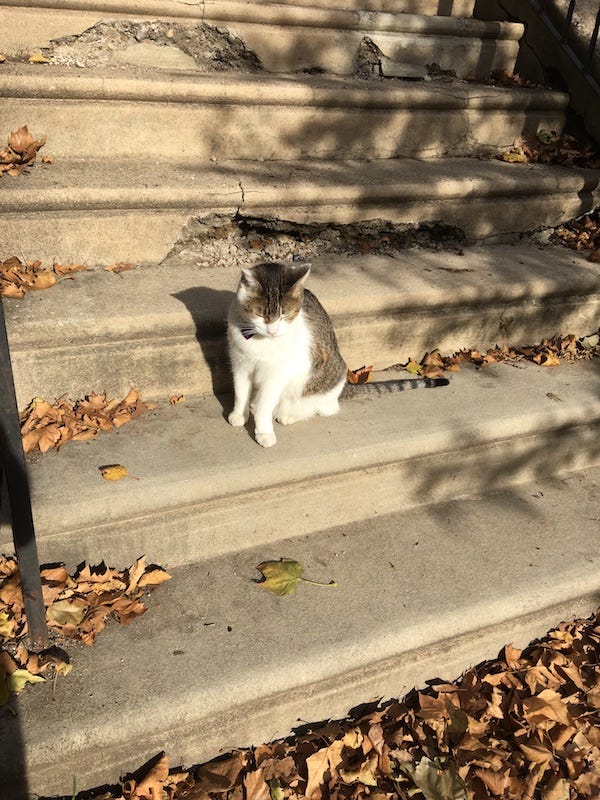Hey, I’m Zoë, and I’m trying to write more in a way that is somewhat productive. If you like my writing, then cool, you are in the right place! You may know me from my sports website The Victory Press. I also tweet at @2tallmountains and @zoeclaire_ and while I remain adamant that tweets are a sort of writing, it’s definitely not longform, cohesive content. It is good to get away from the hell site from time to time to reflect.
About me: I’m a nonbinary queer girl and I live in Philadelphia with my cat, Bee. I grew up in Fayette County, Pennsylvania and am an IT professional.
Here’s an example of a newsletter I wrote when I tried to start a TinyLetter a couple years ago and hopefully the kind of content I can bring you in the future:
How worried have we always been about The End?
I've always been fascinated by apocalyptic imagery and implicit doom and gloom in music and literature, and it seems that this was especially prominent in the stuff I got into when I was very young--via my parents, so maybe that says something about them. The Hitchhiker's Guide to the Galaxy, which became my favorite book when I was something like nine years old, of course starts with the world being blown up due to bureaucracy. Looking back, it totally makes sense where I got all of my ideas about responsibility, authority, and power structures.
I haven't been able to listen to the news at all so I've been revisiting music that I haven't listened to in awhile and the pervasive post-apocalyptic themes are showing themselves again. It's been a little bit cathartic to hear these things coming through my car stereo again, except not so much in the neat-sci-fi way that I thought of these songs as a kid.
So I made a post-apocalypse playlist; kind of.
I think a lot of people are still put off by Frank Black's Teenager of the Year because of how totally frantic and uncomfortable and weird it is. It came out in 1994 but it doesn't really sound like music from any moment in time. He puts together words that look or sound extremely silly and makes them sound prophetic. This is a record that has one of the most beautiful love songs I've ever heard ("Speedy Marie") and an ode to trucker lingo ("True Denizen of the Citizens' Band").
It also has a weird thread of post-apocalyptic reconstruction in it, most notably in "Calistan" which is about journeying to the wasteland that was once California and mispronouncing everything about what "used to be" there. Humans are still around, but maybe not doing very well, with garbage everywhere and air that seems to make them sick. It's kind of a country song from the future?
In "Superabound", the narrator goes to a freakshow in the mountains but finds that he is still bored with his life, which I have always interpreted as a kind of post-apocalyptic ennui.
"Big Red" is an overt nod to global warming destroying the planet and populations dispersing, again with the same kind of imagery as "Calistan" with miles of abandoned concrete (the "black" and "tarmac") being the only way to return from whence you came.
"Space Is Gonna Do Me Good" seems to refer again to rising sea levels with the "islands of Phoenix in two-thousand-sixteen [2016!!!]" and the narrator wants to get shot into space instead of dealing with his life on Earth. This is apparently an option.
Another Frank Black work that has memorably referenced the apocalypse is "Whiskey in Your Shoes", which always interestingly reminded me of that bit from the beginning ofHitchhiker's Guidewhere Ford takes Arthur to the pub before teleporting him off of the planet right as it blows up: "Hey there bartender/Can I owe you the cash?/'Cause the end of the world/Well, it came in a flash."
I got into Mr. Bungle's album California around the time that I got into Frank Black, which seems rather preoccupied with the decay of society thanks to technology on the West Coast, a kind of slow apocalypse but an apocalypse nonetheless. "Retrovertigo" is especially apropos considering how much the phrase "post-truth" is getting thrown around these days: "Now I'm finding truth is ruin/Nauseous end that nobody is pursuing." (But to be fair, I've also been reading a lot of contemporary accounts of major US historical events recently, and something you realize when you look at it over a long period of time is that the mass media has pretty much always lied.)
And do you kind of hear the proto-apocalypse in "This Time Tomorrow" by the Kinks or "Plastic Factory by Captain Beefheart? The latter seems almost situated in the offscreen time before the events of Richard Brautigan's In Watermelon Sugar, out in the deepest reaches of the Forgotten Works.
I like that I can even find a good apocalypse song in stuff I've gotten into more recently; Hallelujah the Hills has this awesome mother fucking rock song with a surprising, jarringly touching outro in which the narrator asks to be convinced that he is alive. Here comes that old occult feeling.
I don't think the world is going to end soon* but I am interested in our collective anxiety as a species over something that clearly has never before happened. What do we base this fear on, from a purely practical perspective? How do we even know to fear it? It's logical to fear, of course, based on what we know about science. But the basis of this seems very deep and emotional and goes back to long before global warming and in fact seems to feature prominently in many world religions. Somehow we understand that we have a lot to lose, in a way that transcends cultural memory. I think we're right in being passionate in our pursuit to save it all, but if we've known all this time that it was impermanent, we should be more careful going forward.
*Jesus I swear to god I'm not usually like this. If I do another one of these I will make it less dreary. Please hold for a picture of my cat enjoying the late autumn sunshine:

